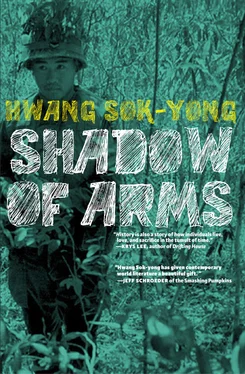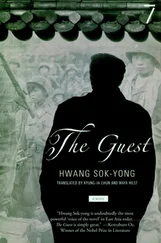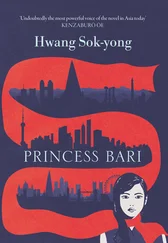But Nguyen Thach did not drag things out. He went back over to the hammock and, sitting in it, said, “While you go to meet with the hospital director, I’ll get back to my siesta that was interrupted. If he agrees, then we can all meet together. That should be the order in which we proceed, don’t you think?”
Yong Kyu just nodded. Reclining in the hammock, Thach stretched one leg down and lightly kicked the floor. The hammock began to swing back and forth. Yong Kyu picked up the telephone and asked the operator to connect him with the Red Cross Hospital. When he was put through he asked to speak with the director himself.
“The director is at home right now,” the hospital operator said. “You should call him at home or else call back in an hour, please.”
He quietly replaced the receiver. Thach seemed to be asleep, his arms listlessly hanging down. Yong Kyu checked his watch. He pictured Dr. Tran’s two-story residence next to the customs house. He drove his van to the gate outside the customs house and pulled up to park in front of Tran’s house. As he pushed open the leaf-patterned iron gate, he heard the fierce barking of a dog. He was relieved to see that Gene had been chained to his kennel at the far corner of the lawn. A brown canvas-topped Jeep was parked in the driveway beneath the front hall. He couldn’t see anyone inside until he had gone up the steps to the front door. After looking around he noticed a stick above the glass door from which a copper bell was hanging. Inside the bell there was a heavy clapper and a doubled leather cord. When he pulled down on it, the cord sprang back and rang the bell. The clear low peal brought Madame Hue out from inside. She was dressed in black Vietnamese pants and a white blouse. When she spoke, Yong Kyu asked in broken Vietnamese whether the doctor was in.
She went back inside and a moment later the portly figure of Dr. Tran appeared, putting on his gold-rimmed glasses as he came through the front hall to the door. Yong Kyu, standing there in his civilian clothes, saluted.
“How are you, sir? I’m Sergeant Ahn, the Korean.”
Dr. Tran did not seemed surprised to see him. But his voice was cold. “What brought you here, Sergeant Ahn?”
“There’s something I need to see you about.”
Tran opened the door. “Come in, please.”
Madame Hue had been watching them. Tran had Yong Kyu sit on the same long wicker sofa where he had sat to have his arm bandaged the other night.
“Is your arm fully healed?” Tran asked.
“Yes, sir, some time ago. It was nothing serious.”
“What’s on your mind, then?” Tran asked with the affected indifference of a mature Vietnamese man.
“Is your son, Huan, at school?”
Tran’s expression softened. “He’ll be back soon. Today is a busy day for me. This afternoon student volunteers will be at the hospital; the girls come every Friday to care for the patients.”
Improvising, Yong Kyu grabbed at the tail of Tran’s remark. “That’s precisely why I’ve come, sir. Our investigation headquarters would like to be of some help to your hospital. I suppose you have many children as patients?”
“Yes, about a third of all the patients are children. What kind of aid can you provide?”
“Well, nothing special in mind, but we thought it might be good to send some gifts the children would like.”
Tran’s face by this time wore a much softer expression than at the beginning.
“I have a little brother about Huan’s age back home.”
“I heard that you have a lot of war orphans back in Korea, too. Wars are even crueler to children.”
Yong Kyu looked around at Dr. Tran’s comfortable living room, cooled by an air conditioner. There was an ivory elephant from Thailand, a stereo, a wet bar stocked with a variety of liquors, a Bengal tiger skin, potted flowers, and other ornaments that seemed to have no connection to the wretched war orphans. Tran wore a gold ring on his plump hand and was stuffing a pipe with Turkish tobacco.
“Do you get the medical supplies you need?” Yong Kyu asked.
Dr. Tran clicked his tongue. “In times like these, medicines are always in demand, no matter how much you can get. Of course, it depends on individual cases, but when treatment is extended, the out-patients keep coming back even after they are discharged from the hospital, and we never have enough for them all.”
“Where do you get your supplies?”
Dr. Tran was about to strike a match to light his pipe, but paused and rolled his eyes. “Our relief medicines come from neutral countries or from some of the Allied forces. Generally, items needed for emergencies are supplied with the help of the American military.”
Madame Hue brought in two glass bowls filled with fruit salad. Picking up a cherry with a silver spoon bearing the design of a monkey, Yong Kyu reflected that in all likelihood he was being served an item he himself had taken out of Turen.
“As I understand it, the hospitals affiliated with army headquarters rely entirely on American supplies for their medicines, and the Americans have no shortage of medicines.”
“They’re soldiers,” Dr. Tran said with a sigh, “but they don’t give the same priority to civilians.”
“Would you like to be supplied with more antibiotics and painkillers?”
“How?” Dr. Tran immediately asked, setting down his bowl.
“The American supply corps is interested in supporting civilian welfare as part of psychological operations. You should send an official letter to the commander of the American supply corps. It’s also a good idea to send him statistics showing the number of patients and their clinical needs. For instance, you can make a request for antibiotics or painkillers corresponding to the number of out-patients as well as in-patients.”
“I did that once before, but they just told me to direct such requests to the Vietnamese military hospitals.”
“Naturally. It’s because you, sir, don’t understand how the military operates. Even the navy hospital only receives its own share from the supply corps according to the number and conditions of their own patients. But if you make a request direct to the supply corps, they’ll make inquiries to the headquarters section in charge of support for civilian welfare. To improve treatment for civilian war casualties could be seen as having a positive psychological impact on the civilian sector.”
“Thank you. You’ve given me a good approach. But I fear it won’t be as easy as you think.”
“Whatever the goal, it is always hard to set a precedent. For the American army, no principle is more important in military administration than following precedents. True, it’s difficult to get something approved, but once it’s put in force you can expect the model to be followed.”
“You have a point. The navy hospital’s reply was a short message simply saying there was no precedent for the request.”
“I can suggest one more thing, sir. If you can set a precedent with medical items that are easy to get approval for, they’ll give you almost any amount you request. I know of a certain village that was supplied with thousands of bottles of salt.”
“Salt?”
“To prevent heatstroke, each soldier gets a daily ration of about five salt pills. Some villages in the jungle asked a nearby troop installation for salt to make nuoc mam . Once it was approved, hundreds of crates of salt pills started to arrive. Instead of requesting cord to weave fishing nets, it is easier to request canned sardines, even if they aren’t quite to your liking. Make a request for Terramycin and I’m sure you’ll get it.”
“We need all kinds of medicine.”
“Of course. But the important thing is making it easy to get the approval. First, get a large supply of Terramycin and then you can sell it.”
Читать дальше












